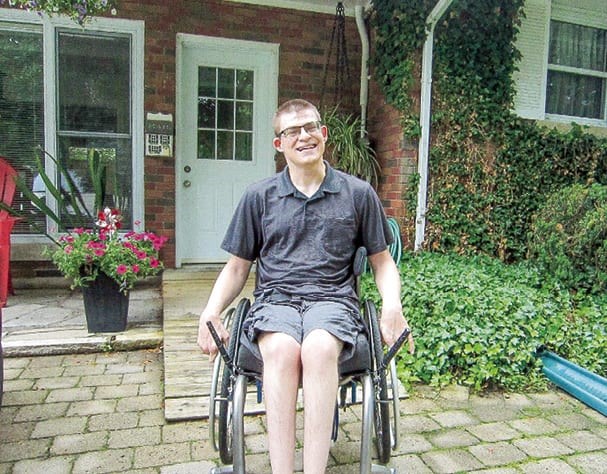Rhys Evans calls for "base level of humanity"
BY JOHN CHICK Special to the VOICE
Rhys Evans knows Ontario disability funding and legislation inside and out. As Pelham’s representative on Niagara’s Joint Accessibility Advisory Committee, not much gets by him when it comes to the overall treatment of Ontarians with physical disabilities.
That’s why he was deeply concerned when he read a recent report that foresees Doug Ford’s conservative government making deep cuts to the Ontario Disability Support Program (ODSP)—a major lifeline for Evans.
“There needs to be a base level of humanity,” said Evans, who has cerebral palsy.
“The thing that bothers me a lot is we have a conservative government and voters who follow Mr. Ford’s platform, but they have no knowledge of what [the government is] doing.”
Evans, 27, said he collects $881 a month from ODSP, a figure that hasn’t changed since he first became eligible for the benefit nine years ago.
Evans has an extremely fortunate living situation at his parents’ comfortable Fonthill home. Most of that $881 however, goes to paying for an accessible van his parents use to get him around.
He said the maximum amount he could collect if he lived on his own is $1,100 a month—well below the official poverty line.
While Ford has not publicly stated he will slash funding to ODSP, itemized expenditure estimates for 2019-20 available on the Ontario government’s website indicates up to $1 billion in cuts from programs like ODSP and Ontario Works.
In response, Evans’ mother, Denise, reached out to Niagara West MPP Sam Oosterhoff but got no reply.
Following two contact attempts by the Voice, Oosterhoff’s office provided a statement.
“Ontarians deserve a system where those with disabilities are treated with dignity and where hard work is met by empowerment and trust from their government,” the statement read. “When compared to the government’s actual spend from the previous year, the budget shows an increased investment in the Ontario Disability Support Program this year. Many people in this province have severe disabilities that make it very difficult to support themselves … and they will be met with compassion and dignity in our new system.”
Pushed on how the “new system” will affect direct benefit amounts or whether a work program is included, Oosterhoff’s staff did not reply to the Voice. They did, however, reach out to Evans.
“We have not had any definite time [sic] on what changes will be being made or when they would be implemented, only that they will be gradual over the next two years,” Oosterhoff’s Community Outreach and Office Manager Pamela Haire said in an email.
That only serves to make Evans more concerned.
“I believe these are code words for extra screening-out, which prevents the most vulnerable people in society from receiving the support they desperately need,” he said. “Less lip service and more action. We are not second-class citizens.”
Part of the challenge, Evans says, is that the government doesn’t have a working definition of what “disabled” actually means. While he uses a wheelchair, Evans has functional mental and communication abilities. Not all are in the same boat.
“I’m lucky enough that I can articulate my feelings,” he said. “A lot of people with autism, for instance, can’t articulate because they’re non-verbal. And when you take away their supports, you take away their voice.”
Evans has worked part-time jobs—including at the Niagara Centre for Independent Living—but knows the employment situation is even tougher for other disabled people out on their own. He says cuts to ODSP will only further harm their ability to find meaningful work.
“I don’t want to sit around and do nothing,” he said. “I want to contribute to society. And they’re taking away our ability to even try.”
Denise Evans added that private-sector charitable support for those with conditions such as cerebral palsy tends to dry up quickly when the afflicted person is no longer a child.
“They’re not cute anymore,” she said.
It is for reasons like this that she and her husband—now both in their 60s—fear for their son’s future.
“Nigel and I have sleepless nights over it, like what will happen?”
The Evans’ point out their concerns aren’t partisan, even if some right-wing governments have demonstrated a perceived lack of compassion for some of the weaker members of society.
“When we travel in the U.S. it’s amazing how accessible everything is,” Denise said.
That’s a byproduct of the Americans with Disabilities Act, passed by the Republican administration of George H.W. Bush in 1990. Some 30 years later, Ontario is still working towards its own accessibility standards, with the goal of making public establishments fully accessible by 2025— hence Rhys Evans’ work with the Joint Accessibility Advisory Committee.
For the moment though, he just wants the opportunity to make a living.
“The question I have for Oosterhoff, and I have for Doug Ford is, what would happen if your family member was in a situation like this?”



